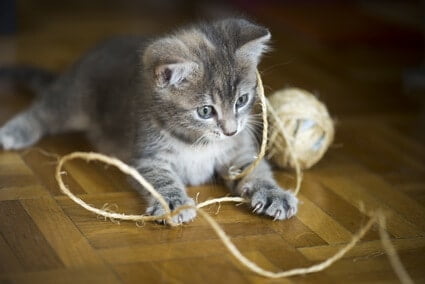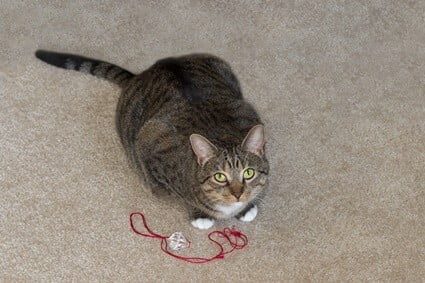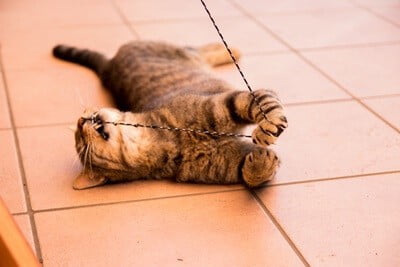It’s no secret that cats love to play with string. Whether it’s shoelaces, ribbons, sewing thread, or a ball of yarn, cats will attack and chew string. While we all want our cats to be happy, this can be dangerous if the string is swallowed.
Never tug on a loose string hanging from a cat’s bottom or mouth. If the string wraps around an internal organ, you could cause damage. Depending on how your cat reacts, surgical removal may be necessary. Ideally, the cat will pass the string naturally, but this outcome isn’t guaranteed.
Find out the warning signs of a cat swallowing string and learn how to get string out of a cat if the worst happens. Knowing some basic first aid precautions may save your cat’s life.
Do Cats Eat String?
Many cats love to play with string. Such play, in itself, is fine as long as an owner supervises the activity. Unfortunately, cats can often take their game too far and attempt to eat and swallow string. There are many reasons why cats may eat string. These include:
- Confusing the string for a prey animal
- Instinctively eating ‘prey’ after hunting string as part of a game
- Chewing on string for pleasure and accidentally swallowing
- Pica, which is a medical condition that drives cats to consume non-edible items
If your cat is making a habit of chewing on string, learn why. Pica is often a symptom of an underlying health concern. It can be genetic – Applied Animal Behavior Science explains that oriental breeds can be predisposed to the habit – but it must be stopped.
Is it Bad for Cats to Eat String?
As discussed above, stopping cats from eating string is one of your key responsibilities. Cats can be prone to eating all kinds of things they should not, but string is at the top of the list. Can cats die from eating string? Unfortunately, yes.
The problem is not the string itself, in most cases. Unless it is made of extraordinary material, string will not be toxic and leave your cat in immediate danger. It is what happens to string within a cat’s body that leads to concern.
What Happens if Cats Eat String?
The best solution will be that the string will pass through your cat’s digestive tract. It will then emerge in your cat’s waste, usually in short order. If the entire piece of string does so, then no harm, no foul.
Sadly, this outcome is comparatively unlikely. Swallowing string leaves a cat at risk of one of three concerns, any of which could prove to be fatal.
Intestinal Blockages
Intestinal blockages are the main concern that arises from swallowing string. As the name suggests, this involves the cat becoming unable to digest food as standard. Often, a piece of string within a cat’s body is called a linear foreign body.
The biggest concern is the string wrapping itself around the digestive tract. The tighter the string is wound, the more discomfort a cat will experience. Crippling stomach cramps are likely.
What’s more, a linear foreign body will prevent the digestive tract from completing its usual tasks. When the cat eats, it will be unable to process the food. As a result, some cats will refuse to consider food. Those that do eat will likely regurgitate their meal.
Another worry that arises from swallowing string is intussusception. This occurs when one piece of the intestine merges with another – frequently ‘cut loose’ by tight string. This will prevent blood flow and reduce the ability to process food.
Your cat will be in pain and unable to gain the essential nutrients necessary to thrive. As explained by the Journal of Small Animal Practice, 37% of all linear foreign bodies in cats are fatal.
The sooner you react to an intestinal blockage, the likelier your cat is to make a full recovery. To be on the safe side, assume that any swallowing of string will lead to such an outcome. Early intervention may prevent this from happening.
Choking Hazards
String can also be a choking hazard. Imagine a piece of string tied around your tongue. You would be unable to swallow until removed. As cats lack opposable thumbs, they cannot remove the string themselves. As a result, swallowed string will remain a constant concern.
Over time, the string will start to curl and tighten. This will cause pain and discomfort, eventually rendering a cat unable to breathe. The cat may swallow its tongue or simply find its airways closing up.
String does not only just need to wrap around the tongue to create a choking hazard. String may also become trapped on a cat’s teeth. From here, it can prevent food from entering the throat and digestive tract as usual. Alternatively, it may untie itself and be swallowed.
Internal Bleeding
Another risk of swallowing string in cats is internal bleeding. Pulled taut, string can be surprisingly sharp and corrosive. Rubbing string against the skin for long enough will cause cuts and bleeding. Internal organs are softer and thus at greater risk.
You will significantly magnify the risk of internal bleeding if you have pulled string out of a cat’s bum. You may think that you’re doing the cat a favor, but the opposite is true, as we’ll discuss in more detail shortly. You’ll be doing potentially irreparable damage.
As explained by the Bulletin of the University of Agricultural Sciences and Veterinary Medicine in Cluj, internal bleeding can be hard to spot. CT scans may be necessary for an official diagnosis.
If you believe your cat has swallowed string, keep a close eye on any stool or urine. At the first sign of blood in your pet’s elimination, consider the issue an emergency. The blood will likely be dark – almost black – in color rather than a bright, luminous red.

How Do I Know if My Cat Swallowed String?
Have you ever wandered into a room and asked, “why is there string in my cat’s butt?” The answer may be something harmless, such as sitting on string. It’s equally likely that the cat has swallowed string, though. Hanging threads have not been cleared by elimination.
If you notice this, you cannot yank the string out. Give it the slightest tug, just to confirm if the string is part of the digestive process. If the string does not give way, call a vet ASAP.
Attempting to force the string out of your cat’s bottom by hand can be harmful. If the string has wrapped around an internal organ, you may cause irreparable damage. This string needs to be delicately removed from within, not externally wrenched out by force.
You may similarly see string hanging out a cat’s mouth. As above, you cannot pull at this thread. The string may run down the cat’s throat, attached to internal organs. Alternatively, it may connect to the tongue or a tooth. Any kind of sharp yank will cause problems.
Don’t assume that no visible sign of string means your cat did not swallow it, either. Your cat may have eaten string in its entirety. That is particularly likely in a small, silky piece of string, such as a ribbon. Tougher string, like yarn, will be harder to swallow.
If you left your cat playing with string, returning to find the string missing, assume it has been swallowed until you find evidence that confirms otherwise. It is better to be safe than sorry. By the time symptoms of string eating manifest, your cat may be in serious trouble.
Can Cats Digest String?
You may be wondering what all the fuss of cats eating string is about. If the string avoids becoming trapped in the stomach, it will surely work its way through the digestive tract? Can cats poop out string?
Unfortunately, string is not digestible and will be broken down by the natural acids found in the body of your cat. A small piece of string will be passed in full when your cat eliminates in a best-case scenario. It’s inadvisable to hope for such an outcome, though.
How Long Does it Take for String to Pass Through a Cat?
If your cat passes string naturally within its poop, this will happen within 24 hours. If the string has not reappeared after this time, it is unlikely to do so. If you wish to encourage faster elimination, consider the following techniques:
- Rub a warm washcloth on your cat’s anus. This evokes memories of kittenhood when the cat’s mother encouraged elimination this way
- Offer your cat a natural laxative. Tinned pumpkin is the safest and most effective choice
- Use an official cat-friendly laxative. According to the Canadian Veterinary Journal, lactulose, Benefiber, or polyethylene glycol are best
- Apply vegetable oil or KY jelly to your cats’ paws, thus softening any stool. Hydration will also have the same effect, so switch on a water fountain if you have one
Visiting the litter tray may help your cat to pass string, but this is by no means a fix-all solution. You’ll still need to observe your cat and follow any professional advice.
What to Do if Your Cat Swallowed String
If your cat swallows string, you’ll need to take appropriate action. External help may be essential. In the meantime, though, you can administer first aid.
Before you do anything else, call your vet and explain the situation. Before picking up the phone, gather as much information as you can. Questions that a vet may ask will include:
- What kind of string did your cat swallow (ribbons, shoelaces, wool or yarn, etc.)?
- How much string has been eaten?
- When did your cat swallow the string?
If you do not know the answers to these questions, say so. This is much safer than making assumptions that could be incorrect and thus harmful.
After an initial consultation, your vet will advise on the next steps, which may involve surgery.
Cut Trailing String
The first thing you’ll need to do is look at your cat, especially around the mouth and bottom. Can you spot any trailing string? If so, this issue needs to be rectified.
This does not mean tugging at the string until it is completely removed. This places your cat’s health in immediate danger. The string may be wrapped around an internal organ, such as the heart. It could also be attached to the tongue or a tooth.
Instead of yanking at this string, pull it taut enough to cut with scissors and do so. Leave just enough to see the string. This means you’ll know if the string is eventually passed as waste or will help a vet assess the problem.
Observe Your Cat
While you’re waiting for further instructions from your vet, keep a close eye on your cat. Look out for any of the following signs of complications arising from swallowing string.
- Struggling to breathe
- Refusal to eat or drink
- Struggling to use the litter tray
- Swelling of the abdomen
- Blood in stool or urine
If you spot any of these symptoms, elevate your cat’s condition to emergency status. Notify your vet of these developments and hurry your cat into professional care.
Encourage Vomiting
If, and only if, your vet recommends it, you can encourage your cat to vomit. Such an approach might be impactful if the cat recently consumed the string. Vomiting will purge anything swallowed within the last 60 minutes or less.
Never force your fingers down a cat’s throat to encourage vomiting. You risk damaging your cat’s esophagus. Instead, mix a solution of 3% hydrogen peroxide and 97% water. Offer one teaspoon of this solution every 15 minutes until your cat vomits.
A good point remits repetition – only attempt this under professional advice. Hydrogen peroxide can be considered dangerous and harmful to cats. It makes them throw up, after all. It is not a remedy to administer lightly.

Surgical Removal of String from Cat’s Stomach
String swallowed by a cat may need to be surgically removed. This is certainly the case if the string is causing an obstruction, wrapping around an internal organ, or otherwise placing the animal’s life in danger.
Initially, a vet will perform an x-ray or endoscopy on your cat. These exams will confirm the presence of string and reveal the extent of the problem. If possible, the string will be unpicked and removed without surgery. This is unlikely, though.
In many cases, a cat will be placed under anesthesia and surgery performed. With access to the string granted, it can be unpicked and unraveled by hand. This may be expensive and not without risk, but it may be the only option open.
Cat Swallowed String Surgery Cost
The cost of surgery is often a stumbling block in pet care. Even a simple procedure after a cat swallows string is likely to cost over $1,000. If the string is wrapped around an internal organ, the bill can soar to four times this sum.
It’s advisable to take out an insurance policy on your cat, just in case such an issue arises. Hopefully, you’ll never need it, but you will not begrudge the few dollars that you pay each month if you do.
If you are not insured and are left facing a sizable bill for surgery, seek help from animal charities. The Humane Society of the United States lists bodies that you can approach. Crowdfunding platforms are also an option to gather donations.
My Cate Ate String But is Acting Normal
Do not assume that, just because your cat is not behaving in a certain way, all is fine. It’s possible that your cat ate string a week ago and is only just feeling the impact. String can be insidious, slowly but surely wreaking havoc inside your pet’s body.
This is not said to frighten you. 72 hours may be long enough to start to relax, especially if you spotted signs of string in your cat’s waste. Just avoid growing complacent. Cats are skilled at masking pain, so do not wait for yours to approach you and express discomfort.
If your cat swallowed string, stay calm – but treat the situation as an emergency. Seek veterinary advice and offer first aid accordingly. If you act quickly, your cat has every chance of being just fine. Do not take a wait-and-see approach, though. Time is of the essence.


My cat has eaten string from carpet and had about 3 feet hanging out his backend what should I do